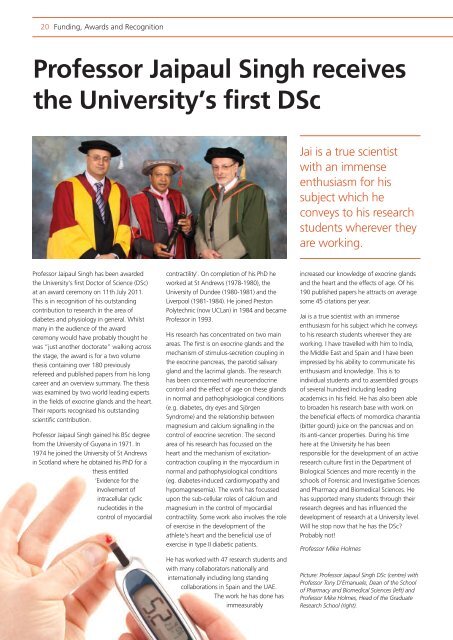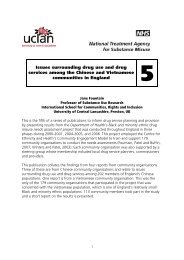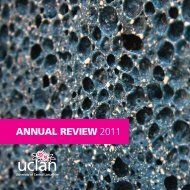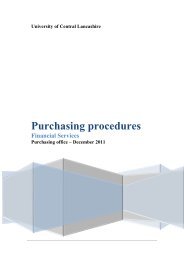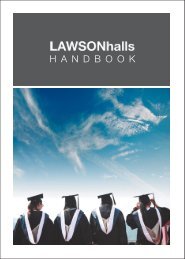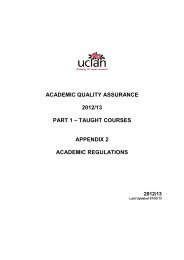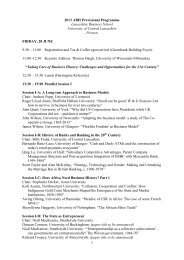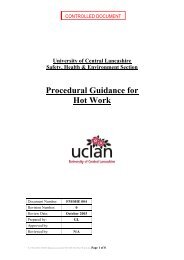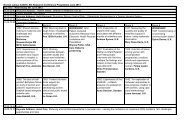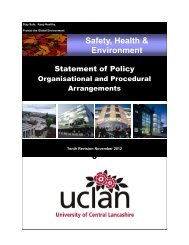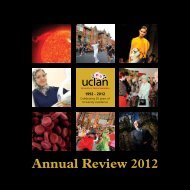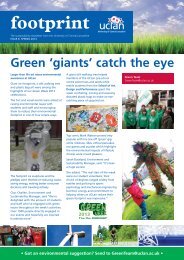Autumn 2011 Issue - University of Central Lancashire
Autumn 2011 Issue - University of Central Lancashire
Autumn 2011 Issue - University of Central Lancashire
Create successful ePaper yourself
Turn your PDF publications into a flip-book with our unique Google optimized e-Paper software.
20 Funding, Awards and Recognition<br />
Pr<strong>of</strong>essor Jaipaul Singh receives<br />
the <strong>University</strong>’s first DSc<br />
Jai is a true scientist<br />
with an immense<br />
enthusiasm for his<br />
subject which he<br />
conveys to his research<br />
students wherever they<br />
are working.<br />
Pr<strong>of</strong>essor Jaipaul Singh has been awarded<br />
the <strong>University</strong>’s first Doctor <strong>of</strong> Science (DSc)<br />
at an award ceremony on 11th July <strong>2011</strong>.<br />
This is in recognition <strong>of</strong> his outstanding<br />
contribution to research in the area <strong>of</strong><br />
diabetes and physiology in general. Whilst<br />
many in the audience <strong>of</strong> the award<br />
ceremony would have probably thought he<br />
was “just another doctorate” walking across<br />
the stage, the award is for a two volume<br />
thesis containing over 180 previously<br />
refereed and published papers from his long<br />
career and an overview summary. The thesis<br />
was examined by two world leading experts<br />
in the fields <strong>of</strong> exocrine glands and the heart.<br />
Their reports recognised his outstanding<br />
scientific contribution.<br />
Pr<strong>of</strong>essor Jaipaul Singh gained his BSc degree<br />
from the <strong>University</strong> <strong>of</strong> Guyana in 1971. In<br />
1974 he joined the <strong>University</strong> <strong>of</strong> St Andrews<br />
in Scotland where he obtained his PhD for a<br />
thesis entitled<br />
‘Evidence for the<br />
involvement <strong>of</strong><br />
intracellular cyclic<br />
nucleotides in the<br />
control <strong>of</strong> myocardial<br />
contractility’. On completion <strong>of</strong> his PhD he<br />
worked at St Andrews (1978-1980), the<br />
<strong>University</strong> <strong>of</strong> Dundee (1980-1981) and the<br />
Liverpool (1981-1984). He joined Preston<br />
Polytechnic (now UCLan) in 1984 and became<br />
Pr<strong>of</strong>essor in 1993.<br />
His research has concentrated on two main<br />
areas. The first is on exocrine glands and the<br />
mechanism <strong>of</strong> stimulus-secretion coupling in<br />
the exocrine pancreas, the parotid salivary<br />
gland and the lacrimal glands. The research<br />
has been concerned with neuroendocrine<br />
control and the effect <strong>of</strong> age on these glands<br />
in normal and pathophysiological conditions<br />
(e.g. diabetes, dry eyes and Sjörgen<br />
Syndrome) and the relationship between<br />
magnesium and calcium signalling in the<br />
control <strong>of</strong> exocrine secretion. The second<br />
area <strong>of</strong> his research has focussed on the<br />
heart and the mechanism <strong>of</strong> excitationcontraction<br />
coupling in the myocardium in<br />
normal and pathophysiological conditions<br />
(eg. diabetes-induced cardiomyopathy and<br />
hypomagnesemia). The work has focussed<br />
upon the sub-cellular roles <strong>of</strong> calcium and<br />
magnesium in the control <strong>of</strong> myocardial<br />
contractility. Some work also involves the role<br />
<strong>of</strong> exercise in the development <strong>of</strong> the<br />
athlete’s heart and the beneficial use <strong>of</strong><br />
exercise in type II diabetic patients.<br />
He has worked with 47 research students and<br />
with many collaborators nationally and<br />
internationally including long standing<br />
collaborations in Spain and the UAE.<br />
The work he has done has<br />
immeasurably<br />
increased our knowledge <strong>of</strong> exocrine glands<br />
and the heart and the effects <strong>of</strong> age. Of his<br />
190 published papers he attracts on average<br />
some 45 citations per year.<br />
Jai is a true scientist with an immense<br />
enthusiasm for his subject which he conveys<br />
to his research students wherever they are<br />
working. I have travelled with him to India,<br />
the Middle East and Spain and I have been<br />
impressed by his ability to communicate his<br />
enthusiasm and knowledge. This is to<br />
individual students and to assembled groups<br />
<strong>of</strong> several hundred including leading<br />
academics in his field. He has also been able<br />
to broaden his research base with work on<br />
the beneficial effects <strong>of</strong> momordica charantia<br />
(bitter gourd) juice on the pancreas and on<br />
its anti-cancer properties. During his time<br />
here at the <strong>University</strong> he has been<br />
responsible for the development <strong>of</strong> an active<br />
research culture first in the Department <strong>of</strong><br />
Biological Sciences and more recently in the<br />
schools <strong>of</strong> Forensic and Investigative Sciences<br />
and Pharmacy and Biomedical Sciences. He<br />
has supported many students through their<br />
research degrees and has influenced the<br />
development <strong>of</strong> research at a <strong>University</strong> level.<br />
Will he stop now that he has the DSc?<br />
Probably not!<br />
Pr<strong>of</strong>essor Mike Holmes<br />
Picture: Pr<strong>of</strong>essor Jaipaul Singh DSc (centre) with<br />
Pr<strong>of</strong>essor Tony D’Emanuele, Dean <strong>of</strong> the School<br />
<strong>of</strong> Pharmacy and Biomedical Sciences (left) and<br />
Pr<strong>of</strong>essor Mike Holmes, Head <strong>of</strong> the Graduate<br />
Research School (right).


